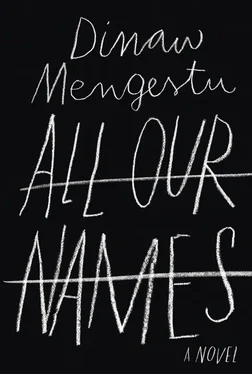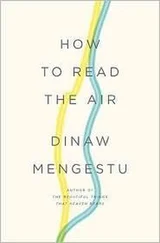I raised my hips and pulled him inside me.
“I’m almost convinced,” I said. His right leg never stopped trembling. Knowing he was afraid made me want to hold on to him that much harder, and I thought if I did so, with time I could help color in the missing parts.
With no outside world to ground us, every moment of intimacy that passed between Isaac and me did so in an isolated reality that began and ended on the other side of his apartment door. I had never had a relationship with a man like that, but I understood how easily the tiny world Isaac and I were slowly building could vanish.
“I am dependent on you for everything,” he often said during our first two months together. He said it sometimes as a joke, sometimes out of anger. He could say it if I had just told him where his glasses were, or if I had taken his clothes out of the washing machine and hung them to dry because I knew he had a habit of leaving them in the washer overnight, and it would be affectionate and charming and made me think that it wouldn’t be so bad to fall in love with a man like this, who noticed the small things you did for him and found a way to say thank you without making you feel like his mother. At other times, he said the same words and all I heard was how much he hated saying them, and how much he might have hated me, at least in those moments, as well.
The list of things he was dependent upon me for grew larger the longer he stayed in our town. In the beginning he needed me only to do my job: to help get him from one point to another, since he had no car or license; to explain basic things, like when and when not to dial 911. Later on, he needed me to sit with him quietly in the dark and hold his hand as he mourned the loss of someone he loved. Once, he called me at work and asked me to leave the phone on the desk, just so he could hear other people talking. He didn’t always know how to fill his days. He had his books — dense historical works and biographies along with a smaller collection of romance novels that he kept hidden under his bed. He read obsessively. When I asked him why, he said it was “to make up for all the lost time,” because he had never had access to libraries like ours until now; but I suspected it had as much to do with not knowing what to do with all those long empty hours. Isaac had none of the good or the bad that came with living in such close, sustained contact with your past. If there was anything I pitied him for, it was the special loneliness that came with having nothing that was truly yours. Being occasionally called “boy” or “nigger,” as he was, didn’t compare to having no one who knew him before he had come here, who could remind him, simply by being there, that he was someone else entirely.
Every aspiring militant, radical, and would-be revolutionary in Eastern and Central Africa was drawn to the university back then. They started coming shortly after the president took power and claimed the country was the first African socialist republic—“a beacon of freedom and equality where all men are brothers” was how he phrased it in the radio announcement given after he staged the country’s first coup. Millions believed him. He spoke the right language, grand, pompous, and humble merged into the same breath. He was from the military, but he claimed he wasn’t an army man, just a poor farmer who had picked up the gun to liberate his people, first from the British and then, after independence, from the corrupt bureaucrats who followed. It was rumored that he had a photographic memory, was a champion chess player, and every weekend returned to his farm to tend to his cattle and crops. Whatever people wanted in a leader and dreamed of for themselves, they found in him. The newspapers ran daily photographs of the president in various guises: the president as father, with a dozen children gathered around him; the president as village leader in a bright red-and-blue costume, using a walking stick, and the president as the intellectual statesman in a three-piece suit that tamed his massive girth and lent an air of sophistication to his bull-sized head.
He gave generously to the university, supposedly from his own pocket. His portrait hung randomly throughout the campus, and for a time it was rumored that the university would be renamed in his honor. For years the patronage kept the students content. They held on to their socialist, Pan-African dream, while ignoring the corruption and violence that touched the rest of the capital, for as long as they could. By the time Isaac and I arrived on campus, the dream had proved rotten and was cast to the side. Among the students there were warring parties split along thin ideological lines. It was Isaac who taught me how to divide the students spread across the lawn in a state of constant protest into two camps: the real revolutionaries and the campus frauds.
“All the battles aren’t equal,” he said. “If you are going to be a writer, you have to be able to know the difference between the boys who come in chauffeured cars and the ones who fought to be here.”
I didn’t tell him the difference was irrelevant to me. I belonged to neither camp and had no interest in choosing. Some students wanted war and revolution, while others pretended to out of their own self-interest. Either way there was a place for outsiders like me as long as I watched safely on the sidelines, but if I wanted to do so, Isaac was right, I had to learn to see like him.
As we walked across the campus, Isaac pointed to various student camps and asked what I thought of that person, or that group. “Is that a real revolutionary?”
Our game started poorly. More than half the time, he claimed I was wrong. After a dozen attempts, I asked him what made him so certain he was always right.
“You know how you can tell who they really are?” he said.
He knelt down and took off one of his shoes and wiggled his dirty toes in the air. He held the shoe, which like my own was covered in dust and had been repaired so many times there was hardly anything left of the sole
“Look at the shoes. Anyone who walks to campus has shoes as ruined as ours.”
For several days, we lay on the grass and pointed out all the polished shoes that passed us. It took a day before I no longer saw the students as a general, uniform mass. They were a part of the same campus body but it was fractured into dozens of discrete parts that were loosely connected and rarely touched. Once I understood that, I knew what to look for when I studied the students. After two days I told Isaac, “I don’t have to see the shoes. I can tell by the way they stand.” I pointed to packs of boys on the other side of the campus and said, “Chauffeured car,” and according to Isaac, I was always right. Privilege lifted the head, focused the eyes. I knew that before I came to the capital and had assumed there were better rules at the university. After several days of watching, Isaac decided it was time to do more than point.
“We should introduce ourselves to them,” he said.
He didn’t bother to explain why. He stood up, and as he walked away from the corner of the campus that I had begun to think of as ours, he turned back to say, “This won’t take long.”
Isaac had taught me how to notice, but not watch. As he drew close to a group of three handsomely dressed boys standing almost within earshot of us, I briefly turned away, both embarrassed and afraid of what would happen next. When I looked up, he was already on his way back to me.
“What did you say to them?” I asked him.
“Nothing,” he said.
“Then why are they staring at you?”
“Maybe they didn’t understand my question?”
“Which was?”
“I asked them if they had enough room in their fathers’ cars for all of us.”
Читать дальше












